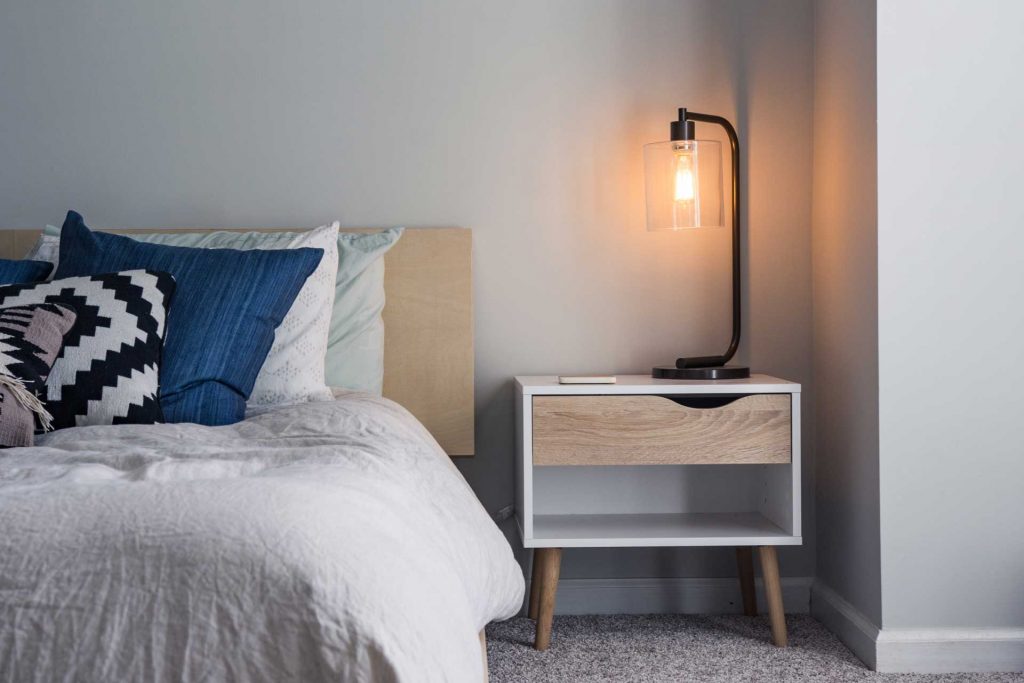This tip guide lists everything you need to look for to make sure you get the most out of your property viewing.
Property layout
- Size – think about whether the property is the right size. Are the rooms big enough for your furniture? Bring a tape measure and map out where items will fit in each room. On the other hand, will you be stretching your budget for extra space you do not need?
- Storage – check each room for storage space. In the bedrooms, if there isn’t storage built in, factor in the size of wardrobes and drawers when looking at their shape and size.
- Potential renovations – would you prefer an open layout? Check whether any interior walls can be removed to create an open-plan space. Can the loft be converted? If you are a growing family, this could be a potential future project.
Fixtures and fittings
- Interior walls, floors, and tiles – check the walls for any cracks, including signs of any that have been freshly painted over. If you can fit a 10p piece into a crack (around 3mm) it could be a sign of subsidence. Check the condition of any carpets or floorboards, looking out for any stains – these could potentially be cleaned up before you move in.
- Check appliances – if any of the appliances are included, make sure you test to see if they are working.
- Fireplaces – are they operational? When were they last swept?
- Damp – keep an eye and nose out for damp in every room, including storage areas.
Windows and doors
- Condition – do they open and close easily? Are the seals in good condition? Check the condition of the window and door frames too.
- Type – What glazing are the windows? This could affect your energy bills.
- Locks – test all the locks to see if they are working correctly. Are any of them old and need replacing?
Plumbing and electrics
- Boiler – the boiler can potentially be a big cost if it needs replacing. Ask how old it is and check its service history. Is it still under warranty? Turn on a hot tap to test how long it takes for hot water to come through.
- Taps, showers, baths, and toilets – check that all the taps work and observe the water pressure. Do the same for the shower and bath. Give the toilets a flush to see if they are faulty.
- Lights and power sockets – test all the lights and check the plugs. An easy way to do this is to bring along a phone charger and test charging your phone.
- Fuse box – find out how old the fuse box is and when it was last serviced.
Utilities
- Mobile signal – while you are looking around the property, check your phone signal.
- Broadband and TV connections – is fibre broadband available? Are there fibre, telephone and TV sockets in the property and are they in a sensible location. Is there a satellite outside?
Garden and exterior
- Brickwork and rendering – look over the brickwork, rendering and pointing for it’s general condition.
- Roof – if it’s a tiled roof, check the condition and look out for any broken tiles. If there is a flat roof, ask when it was last checked.
- Gutters and drains – the gutters are important as any issues here can have a knock-on effect to the rest of the property, usually causing damp. Check for any cracks or leaks, you may be able to spot dark patches on the brickwork directly below if there are any. Have a look at the drains to see if they are clogged up.
- Parking – is there enough space for the cars you have? If not, is there on road parking nearby?
- Garden direction – check the direction so you can get a feel for how much sunshine you are likely to get.
- Maintenance – think about the size of the garden and whether it’s a manageable size. Larger gardens can require lots of maintenance.
Local area
- Traffic – get a feel for how busy the road is by spending a bit of time outside the property. If you can, visit at different parts of the day including rush hour to get an honest account of the traffic.
- Commute – if possible, re-enact your commute to work from the property. Even better if you can do it during rush hour.
- Local amenities – more in depth research can be done before and after your viewing, but when you are in the local area you can get a good sense on where your local shop is, the closest pub, schools and GP surgery.
- Public transport – don’t forget the closest public transport options.
Over COVID-19
- Viewings must only take place with serious buyers who are genuinely interested in the property.
- Initial viewings should be done online as virtual viewings.









